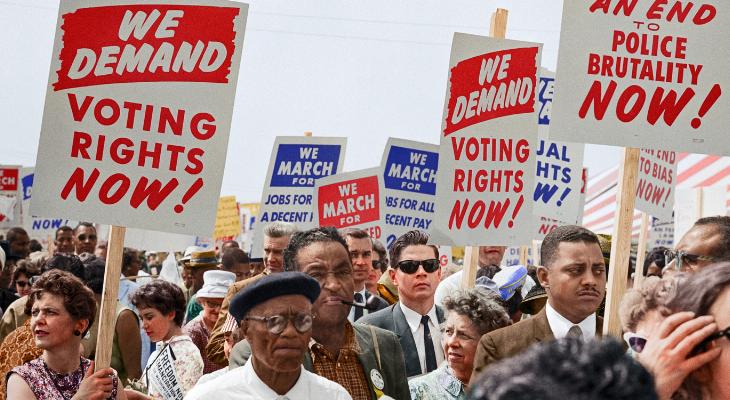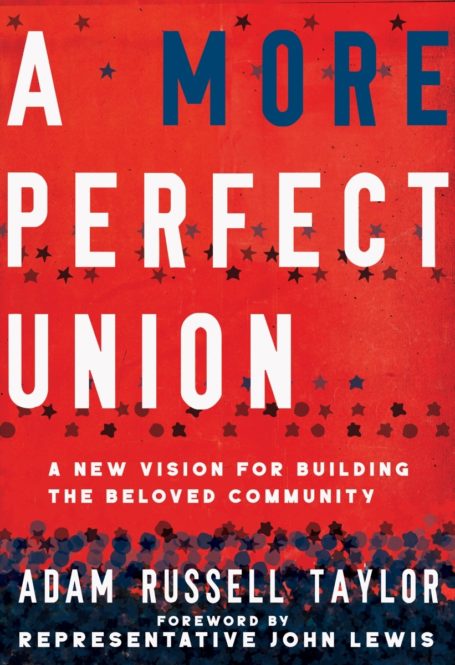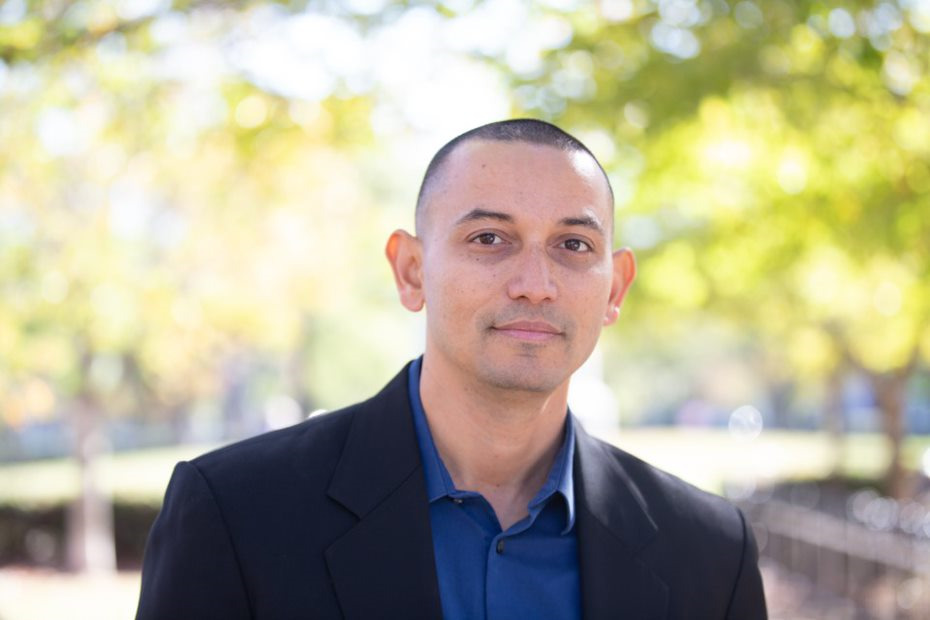Voting is Sacred: Can We Build a More Perfect Union?
January 7, 2022

The following excerpts are from the Rev. Adam Russell Taylor’s book, “A More Perfect Union: A New Vision for Building the Beloved Community.” Order the book here.
Many historically important moments are often misunderstood or ignored entirely in our history books and collective memory. A few examples include the demise of Reconstruction, the emergence of the Southern Strategy, and the birth of the Religious Right. The first involves the period just after Reconstruction. We easily forget just how short-lived the period of Reconstruction after the end of the Civil War was— and the role an insidious political compromise played in reversing the gains of that era. The Emancipation Proclamation freed African slaves, and the passage of the Thirteenth, Fourteenth, and Fifteenth Amendments, fostered a short-lived rebirth or second founding of the nation after the Civil War, extending and protecting the rights of all citizens. However, it also resulted in a significant backlash, particularly in the South, culminating in the Compromise of 1877, in which Republican presidential candidate Rutherford Hayes struck a deal with Southern Democrats to settle the highly contested 1876 election. As a bipartisan congressional commission debated the outcome, allies of Hayes met in secret with moderate Southern Democrats to negotiate acceptance of Hayes’s election. The Democrats agreed not to block Hayes’s victory on the condition that Republicans withdraw all federal troops from the South. This consolidated Democratic control over the region. As the withdrawal of federal troops from the South commenced, Southerners reimposed new forms of enslavement under the guise of sharecropping and later through the system of Jim Crow segregation. Imagine how our nation’s history might have evolved differently without this bitter betrayal of Black freedom.
A second historically significant truth that is often ignored is the impact of the Republican Party’s ongoing embrace of the “Southern Strategy,” which has profoundly shaped and influenced our nation’s politics ever since, culminating in many respects in the election of President Trump. To understand the Southern Strategy, we must look at a pivotal moment: when President Lyndon Johnson signed the Voting Rights Act of 1965. President Johnson, who defied Southern Democrats in pushing this watershed legislation to guarantee Black Americans the right to vote, predicted that his support for this bill would cost the Democratic Party a generation of voters in the South.
Share
Related Articles
American Civic Life
Interfaith America Interview
American Civic Life

President Johnson’s prediction proved right. Through the 1960s and ’70s, the nation went through a significant political realignment due to an exodus of white Southern Democrats to the Republican Party. This was solidified by an overt plan that leaders in the GOP used to stoke racial fear and grievances in what has come to be called the Southern Strategy. The Southern Strategy started with Barry Goldwater’s 1964 presidential campaign. Angie Maxwell explains, “Originally called ‘Operation Dixie,’ the strategy aggressively championed Sen. Goldwater’s vote against the 1964 Civil Rights Act.” Largely because of this strategy, despite Johnson’s landslide overall victory, Goldwater carried five Deep South states, including 87 percent of the vote in Mississippi. His blunt appeal turned off many other voters, as these states and his native Arizona were the only ones Goldwater won. Yet others took note of the strategy and its success in Southern states.
Taking lessons from Goldwater’s overt and strident racist appeals, the next election cycle brought Nixon’s team, which employed more coded language. This included his calling for the restoration of “law and order,” which signaled his support for an end to protests, marches, and boycotts. And it foreshadowed his declaration of a “war on drugs,” which played on racialized fears about the rise of crime. During his 1980 presidential bid, Ronald Reagan expanded Nixon’s racial code to include supposedly “colorblind” appeals for economic justice, according to Maxwell. Reagan encouraged Americans to “move past race,” even as he invoked the image of the “welfare queen,” a stereotypical, caricatured Black woman Reagan described as having “‘80 names, 30 addresses, [and] 12 Social Security cards,’ resulting in a tax-free income of $150,000.” Through this scapegoating and stereotyping, Reagan portrayed racial minorities as undeserving “takers,” while ignoring the institutional racism that is so often at the heart of economic inequity. To lower-income and middle-class white Southern voters, according to Maxwell, his message was clear: “African Americans were to blame for their own standing in society and . . . government programs aimed at alleviating racial inequities would disadvantage white Americans.” Through these and other efforts, Maxwell points out, “the GOP successfully fused ideas about the role of government in the economy, women’s place in society, white evangelical Christianity and white racial grievance, in what became a ‘long Southern strategy’ that extended well past the days of Goldwater and Nixon,” setting the stage for Trump’s presidential run in 2016.
Likewise, Michelle Alexander, a visiting professor at Union Theological Seminary and author of The New Jim Crow: Mass Incarceration in the Age of Colorblindness, writes in the New York Times,
Contrary to what many people would have us believe, what our nation is experiencing is not an “aberration.” The politics of “Trumpism” and “fake news” are not new; they are as old as the nation itself. The very same playbook has been used over and over in this country by those who seek to preserve racial hierarchy, or to exploit racial resentments and anxieties for political gain, each time with similar results. Back in the 1980s and ’90s, Democratic and Republican politicians leaned heavily on the racial stereotypes of “crack heads,” “crack babies,” “super predators,” and “welfare queens” to mobilize public support for the War on Drugs, a get-tough movement and a prison-building boom—a political strategy that was traceable in large part to the desire to appeal to poor and working-class white voters who had defected from the Democratic Party in the wake of the civil rights movement.
It is impossible to understand the evolution of American politics without understanding the impact of the Southern Strategy—in all its guises and iterations—on both political parties and ultimately on all Americans.
This calls for a clear-eyed acknowledgment of the truth and calls for us to correct, refute, and address biased or ahistorical teachings that whitewash our history and compromise our voting rights. The only way we can move to a true Beloved Community is in telling the truth about what this country has done, including, notably, the intense racism that has driven voting rights. The political, religious, ethnic, and racial drivers that so often twist our histories into destructive and ahistorical narratives—whether overt or encoded—poison the pursuit of a more perfect union and just America. The Beloved Community teaches us that only by understanding, sharing, insisting on, and advocating for the whole truth can we cocreate the America we hope for.
The Beloved Community teaches us that only by understanding, sharing, insisting on, and advocating for the whole truth can we cocreate the America we hope for.
The Beloved Community teaches us that only by understanding, sharing, insisting on, and advocating for the whole truth can we cocreate the America we hope for.
Free, fair, and safe elections are the lifeblood of a healthy and vibrant democracy. Sadly, the right to vote has been intentionally restricted ever since our nation’s founding, when it was only granted to landowning white males. Continually it must be continually protected and broadened until all adult citizens are truly free to exercise their right to the ballot box. Voter suppression disfigures our democracy and has propped up white supremacy from our nation’s inception.
Many Republicans seem addicted to a strategy of depressing turnout and making it more difficult for certain communities, particularly people of color, to vote—a last-ditch way to win elections and hold on to power despite the nation’s changing demographics. Republican operatives have admitted that this is their deliberate strategy. Former president Trump tweeted that voting by mail would hurt Republicans, which helps to explain why he relentlessly sought to cast doubt on mail voting and made baseless claims of widespread voter fraud in an election his own Department of Homeland Security declared “the most secure in American history.” According to the Brennan Center for Justice, in a seeming backlash to historic voter turnout in the 2020 election, as soon as February 19, 2021, Republican leaders in thirty-three state legislatures had already proposed over 165 pieces of legislation that would further restrict the right to vote by limiting mail voting, imposing stricter voter ID requirements, slashing voter registration opportunities, and enabling aggressive voter roll purges.
The big lie of widespread voter fraud distracted attention from the real fraud that has been orchestrated in states across the country through voter suppression tactics such as robocalls targeting Black and Latino voters with disinformation, spreading conspiracy theories, and seeking to depress turnout. It’s purges that seek to remove people from voter rolls who haven’t voted consistency or have changed their address. It’s long lines and broken voting machines that just happen to be concentrated in communities of color. It’s the threat of voter intimidation and even violence fomented by the rhetoric of President Trump and other politicians. “One person, one vote” is a mirage if we are silent about and don’t actively resist these and other insidious tactics. Protecting every vote should be a nonpartisan cause and commitment. Protecting every voter is also a faith imperative.
Jim Crow is like a mutating gene that continues to show up in covert and overt tactics to suppress the vote of minority populations—most acutely against the Black community. This is nothing new. The right to vote has been deeply contested since the founding of our nation. More stringent voter-ID laws and the purging of voting rosters simply represent contemporary versions of poll taxes and literacy tests. In the timeless words of Frederick Douglass, “There is no progress without struggle.” The work must continue in the ongoing struggle for voting rights. Progress, this struggle proves, can be fragile and fleeting—and must be continually defended.
Following the Supreme Court’s decision in Shelby County v. Holder in 2013, states were free to adopt voting laws adversely impacting minority voters, including laws instituted to eliminate polling places, move them to less accessible locations, or reduce the hours they are open. Many states have put in place new laws to enact stricter voter-ID requirements and reduce early voting and Sunday voting, which are popular among minority voters in certain regions. The Brennan Center for Justice found that from 2010 to 2018, twenty-three states enacted more restrictive voter registration or hyper-partisan gerrymandering.

The Rev. Adam Russell Taylor. Courtesy photo
The Lawyers and Collars / Turnout Sunday initiative, which Sojourners and the National African American Clergy Network partnered together with around in the 2018 and 2020 elections, was rooted and motivated by our understanding and commitment to imago dei—embracing every person as made in the image of God—which confers upon every voter equal worth and dignity. Dr. Barbara Williams-Skinner, president of the Skinner Leadership Institute, which also led Lawyers and Collars / Turnout Sunday, said, “During the 2020 election, our network of over a thousand clergy wearing sacred collars and lawyers provided moral and legal protection at vulnerable voters’ polling sites and secured their right to vote in free, fair, and safe elections. This multiracial and interfaith clergy network modeled Dr. King’s Beloved Community by affirming the image of God in historically disenfranchised citizens, whose vote became acts of moral resistance to long-standing racially motivated voting barriers.” And so it becomes clear that protecting the right to vote affirms the divine image and inherent value of all God’s children. In the theological context of imago dei, we see that nothing diminishes the rule of law and our precious democracy more than voter suppression and efforts to disenfranchise or squelch the voice of minority voters. The Beloved Community supports those who are most vulnerable and ensures that they have a voice in the decisions that affect their lives.
Protecting every voter is also a faith imperative.
Protecting every voter is also a faith imperative.
Fortunately, many victories have been won at the state level to revitalize our democracy. For example, in the past few years, hundreds of pro-voter bills were introduced in forty-six states. Maine enacted automatic voter registration, New Mexico same-day registration, and New York small-donor public financing. Voting rights were restored or expanded for those with past criminal convictions in Kentucky, Colorado, Nevada, Illinois, Louisiana, and New Jersey. In 2019, the House passed H.R. 1, the “For the People Act of 2019.” While Senator Mitch McConnell refused to take up the bill in the Senate, this watershed legislation contained key reforms to revitalize American democracy—including automatic voter registration, small-donor public financing, redistricting reform, and a commitment to restore the Voting Rights Act. It sought to make voting easier and more accessible, lower barriers to running for office, and empowering voters to choose their representatives, rather than let representatives choose their voters.
A report of the American Academy’s Commission on the Practice of Democratic Citizenship called Our Common Purpose: Reinventing American Democracy for the 21st Century a timely, thoughtful, and more comprehensive set of recommendations to reinvent and revitalize our democracy.
Revitalizing democracy also requires embracing a greater commitment to truth and integrity in our public life.
“Who is my neighbor?” a man once asked Jesus in the well-known parable of the good Samaritan (Luke 10:25–37). In his response, Jesus makes clear that our neighbors are not simply those who are like us but also those who are unlike us or who are seen as the “other.” The significance of that question becomes clear as we begin to understand that a healthy democracy and the Beloved Community are built by those who love, advocate with, and support their neighbors. Politics matters because our neighbors and their rights matter.
At the root of the word politics is the Greek word polis, which refers to “a small state run by citizens.” I like this definition because revitalizing democracy will require the active engagement and participation of each of us, particularly those who historically have been shut out. Revitalizing our democracy is imperative as it provides the groundwork for building the Beloved Community.
“A More Perfect Union: A New Vision for Building the Beloved Community” from the Rev. Adam Russell Taylor is available now from Broadleaf Books.
Watch Rev. Adam Russell Taylor and the other panelists in the Why Voting is Sacred: An Interfaith Response to Protecting Our Democracy webinar, and read the transcript here, where you can also find additional resources.



